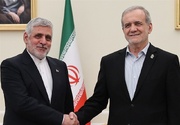The foreign secretary explained the government's stance in an appearance before the House of Lords International Relations and Defence Committee.
Making anti-Iran statements, he told the committee that all of the things they need to do to put pressure on Iran are in place through our sanctions.
Sky News quoted him as saying, "There is a disadvantage, to be frank about it, from proscription, which is it would effectively end diplomatic relations, and while our diplomatic relations are pretty terse, and I say that with meaning as someone who has had very many conversations with the Iranian foreign minister, we are actually able to have that conversation."
He added that he doesn't want to ring up his French counterpart and say 'Could you message the Iranians with this message?' when he wants to discuss something with Iran.
"I think that is not in Britain's interest, that wouldn't strengthen our approach, in many ways it would weaken it."
Back in April, Iran's Embassy in the UK hit out against a "malicious" campaign by British parliamentarians to ban the Islamic Revolutionary Guards Corp (IRGC).
Iran's Embassy in the UK told Middle East Eye that the call to proscribe the IRGC was being pushed by "a few specific individuals and groups who are aiming to diminish and destroy the Iran-UK relationship".
"We believe that the push to designate the IRGC is influenced by external actors, notably the Israeli regime, which has a history of antagonism towards Iran," said the embassy in a statement.
"This attempt serves to escalate tensions and provoke confrontation rather than promote peace and stability in the region."
The embassy said the IRGC had been crucial in countering "terrorist threats and extremist groups" in the Middle East, including the ISIL.
"Accusations of terrorism against the IRGC are lack of substantiation and are driven by political agendas, serving only to benefit certain interests," it said.
MP/PR

























Your Comment